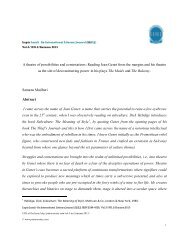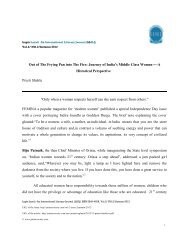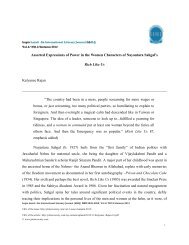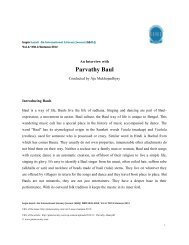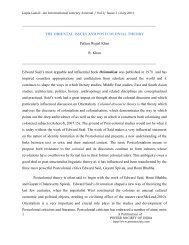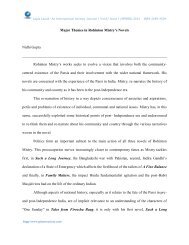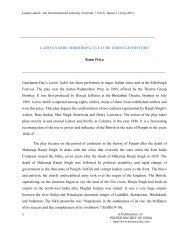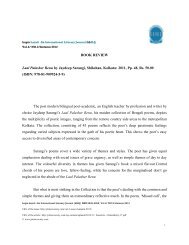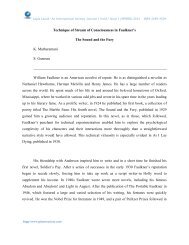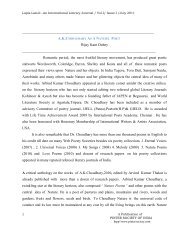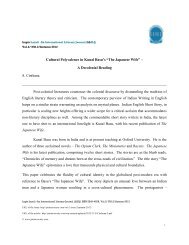The Falling Apart of Things in Chinua Achebe's Things ... - lapis lazuli
The Falling Apart of Things in Chinua Achebe's Things ... - lapis lazuli
The Falling Apart of Things in Chinua Achebe's Things ... - lapis lazuli
You also want an ePaper? Increase the reach of your titles
YUMPU automatically turns print PDFs into web optimized ePapers that Google loves.
Lapis Lazuli –An International Literary Journal / Vol.II/ Issue I /SPRING 2012 ISSN 2249-4529<br />
Jitendra Kumar Mishra,<br />
<strong>The</strong> <strong>Fall<strong>in</strong>g</strong> <strong>Apart</strong> <strong>of</strong> <strong>Th<strong>in</strong>gs</strong> <strong>in</strong> Ch<strong>in</strong>ua Achebe’s <strong>Th<strong>in</strong>gs</strong> Fall <strong>Apart</strong><br />
______________________________________________________________________________<br />
Albert Ch<strong>in</strong>ualumogu Achebe (born 1930) <strong>in</strong> his novel <strong>Th<strong>in</strong>gs</strong> Fall <strong>Apart</strong> depicts beautifully the<br />
fall<strong>in</strong>g apart <strong>of</strong> th<strong>in</strong>gs once well settled or the demolish<strong>in</strong>g <strong>of</strong> a well settled civilization <strong>of</strong> the Ibo<br />
(Igbo) clan <strong>of</strong> Nigeria, West Africa. <strong>The</strong> novel beg<strong>in</strong>s with the <strong>in</strong>troduction and description <strong>of</strong><br />
the protagonist – Okonkwo – who is “well known throughout the n<strong>in</strong>e villages and even<br />
beyond”. He is a man <strong>of</strong> mascul<strong>in</strong>e power, courage and bravery. He is a self made farmer by<br />
pr<strong>of</strong>ession and a successful wrestler by hobby. He is a hardwork<strong>in</strong>g man and shows no weakness<br />
– emotional or otherwise – to anyone. He is one <strong>of</strong> the leaders <strong>of</strong> his village Umu<strong>of</strong>ia and his<br />
place <strong>in</strong> that society is „what he has striven for his entire life‟. He is known and esteemed as a<br />
great warrior <strong>in</strong> all the n<strong>in</strong>e villages <strong>in</strong>clud<strong>in</strong>g Umu<strong>of</strong>ia, his own village. Umu<strong>of</strong>ia is the most<br />
powerful village among all the n<strong>in</strong>e neighbor<strong>in</strong>g villages <strong>of</strong> the region and can be considered as<br />
the capital or the represent<strong>in</strong>g village <strong>of</strong> the same. It has a well established civilization and the<br />
same exists <strong>in</strong> other villages too. <strong>The</strong> residents <strong>of</strong> these villages are the people from Ibo (Igbo)<br />
Clan, which is the ethnicity <strong>of</strong> the author himself.<br />
It is not thoroughly accord<strong>in</strong>g to W B Yeats‟ poem “<strong>The</strong> Second Com<strong>in</strong>g” that th<strong>in</strong>gs fall apart<br />
because the centre is unable to hold it. <strong>The</strong> centre <strong>of</strong> the Ibo clan is strong enough to hold its<br />
people and civilization but the mere anarchy which is loosed upon the world by the English<br />
htpp//www.p<strong>in</strong>tersociety.com
Lapis Lazuli –An International Literary Journal / Vol.II/ Issue I /SPRING 2012 ISSN 2249-4529<br />
people affects it and forces it slacken its hold. <strong>The</strong> blood – dimmed tide loosed from England<br />
reaches up to Africa and drowns the <strong>in</strong>nocent people <strong>of</strong> the Ibo clan. It is this ceremony <strong>of</strong> the<br />
drown<strong>in</strong>g <strong>of</strong> the <strong>in</strong>nocent Ibo civilization that the best <strong>of</strong> the civilization surrenders all its<br />
convictions before the passionate <strong>in</strong>tensity <strong>of</strong> the worst. <strong>The</strong>re is not any one th<strong>in</strong>g that falls apart<br />
<strong>in</strong> this novel. <strong>The</strong> author has used the plural word „th<strong>in</strong>gs‟ which <strong>in</strong>dicates more than one at a<br />
time. At the first glance it might seem that only one or two th<strong>in</strong>gs fall <strong>in</strong> this novel apart viz.<br />
Okonkwo and his pride or the Ibo civilization or the both but on a m<strong>in</strong>ute speculation we realize<br />
that many th<strong>in</strong>gs fall at once apart with the other. As <strong>in</strong> a storm many th<strong>in</strong>gs are blown away at<br />
once <strong>in</strong> this novel many th<strong>in</strong>gs demolish at once with the advent <strong>of</strong> the English people, their<br />
religion, and their civilization. <strong>The</strong> fall<strong>in</strong>g apart <strong>of</strong> th<strong>in</strong>gs <strong>in</strong> the <strong>Th<strong>in</strong>gs</strong> Fall <strong>Apart</strong> thus enlists the<br />
fall<strong>in</strong>g apart <strong>of</strong> several th<strong>in</strong>gs at once. We can analyze the fall<strong>in</strong>g apart <strong>of</strong> all those th<strong>in</strong>gs under<br />
the head<strong>in</strong>gs follow<strong>in</strong>g below:<br />
<strong>The</strong> Society:<br />
Achebe depicts the Ibo as a people with great social <strong>in</strong>stitution <strong>in</strong>clud<strong>in</strong>g the wrestl<strong>in</strong>g match on<br />
a certa<strong>in</strong> market day, various types <strong>of</strong> sacrifices made to please their chi or their personal god<br />
and their aversion for suicide. <strong>The</strong>ir culture is heavy <strong>in</strong> traditions and laws that focus on fairness<br />
<strong>of</strong> the justice and the consent <strong>of</strong> the clan. <strong>The</strong> people are not ruled by any k<strong>in</strong>g or chief but by a<br />
k<strong>in</strong>d <strong>of</strong> democracy, where the males meet and make decisions by consensus and <strong>in</strong> accordance<br />
with an “Oracle” that should be written down. It is a male dom<strong>in</strong>ated society or a patriarchal<br />
society, no doubt, where all the decisions are taken by men and women are expected to follow<br />
them. <strong>The</strong> society believes <strong>in</strong> polygamy and allows a man to marry more than one wife at a time.<br />
Okonkwo‟s marry<strong>in</strong>g three wives is an example <strong>of</strong> polygamy exist<strong>in</strong>g <strong>in</strong> the society. <strong>The</strong> female<br />
members <strong>of</strong> the clan are nevertheless considered to be <strong>in</strong>ferior to the male members they have<br />
got their value <strong>in</strong> the clan and any suitor <strong>in</strong>tend<strong>in</strong>g to marry a lady has to pay a bride price. But<br />
<strong>of</strong> course it is not considered as a sale <strong>of</strong> one‟s daughter. K<strong>in</strong>ship and blood relations are very<br />
important among the Ibo people and it is not that once the groom‟s party has paid the bride price<br />
htpp//www.p<strong>in</strong>tersociety.com
Lapis Lazuli –An International Literary Journal / Vol.II/ Issue I /SPRING 2012 ISSN 2249-4529<br />
it has bought it for ever and the bride breaks all her relations from her family members. <strong>The</strong><br />
maternal side <strong>of</strong> a child is equally important for him as is the paternal. When Okonkwo is<br />
expelled from Umu<strong>of</strong>ia and is <strong>in</strong> exile he is given shelter <strong>in</strong> Mbanta, the village which his mother<br />
belonged to. His maternal uncle Uchendu helps him adequately and never lets him feel as if not<br />
<strong>in</strong> his father‟s home. Besides, the Ibo ma<strong>in</strong>ta<strong>in</strong> a very strong fraternal relation like any developed<br />
society <strong>of</strong> the world. It is not the system <strong>of</strong> the clan to break all their relations when someone<br />
falls <strong>in</strong> a problem. When Okonkwo is <strong>in</strong> his ra<strong>in</strong>y days destitute <strong>of</strong> money, land, crops and<br />
everyth<strong>in</strong>g Obierika still helps him <strong>in</strong> all possible ways and never lets him feel away from his<br />
belong<strong>in</strong>gs. It is this depth <strong>of</strong> the relations and this bond <strong>of</strong> the blood that falls apart when the<br />
English people set foot on to it.<br />
Monetary system is well developed among the Ibo people and they know how to make their<br />
transactions. <strong>The</strong>y pay money to the bride‟s father but do not pay it as is paid while buy<strong>in</strong>g an<br />
animal <strong>in</strong> the market. <strong>The</strong> bride price is not a matter <strong>of</strong> barga<strong>in</strong> <strong>in</strong> the open. It is barga<strong>in</strong>ed<br />
count<strong>in</strong>g broom – sticks which symbolizes the amount <strong>of</strong> the bride price. <strong>The</strong>y give respect to<br />
every member <strong>of</strong> the clan equally. Old members <strong>of</strong> the clan are treated with special regard and<br />
reverence. <strong>The</strong>y have a democratic type <strong>of</strong> governance <strong>in</strong> which every person <strong>of</strong> the clan is<br />
considered to have equal importance and the consent <strong>of</strong> everyone is a must for any decision.<br />
Everyone is free to give his personal op<strong>in</strong>ion and there is no restriction to vote for or aga<strong>in</strong>st any<br />
particular decision but it never means that a person can be slack <strong>in</strong> attend<strong>in</strong>g the meet<strong>in</strong>gs or<br />
dispos<strong>in</strong>g the duties assigned to him. Whenever an „ogene‟ is heard cry<strong>in</strong>g „gome, gome, gome,<br />
gome‟ every man <strong>of</strong> Umu<strong>of</strong>ia becomes alert and whenever there is any call for a meet<strong>in</strong>g the<br />
whole Umu<strong>of</strong>ia is bound to gather at the market place on the prescribed schedule. <strong>The</strong>y have a<br />
well developed trade which helps them get their requirements easily fulfilled. <strong>The</strong>y do not have<br />
access to a watch but they know how to calculate time by count<strong>in</strong>g and compar<strong>in</strong>g any activity<br />
with the occurrences <strong>of</strong> the market days. <strong>The</strong> society is not a nomadic but is <strong>of</strong> an agrarian type<br />
and every family <strong>in</strong> the clan has an „obi‟ or a hut separately for themselves and their cattle. Many<br />
families have provision for the guest room too where they can receive their guests. <strong>The</strong> society is<br />
htpp//www.p<strong>in</strong>tersociety.com
Lapis Lazuli –An International Literary Journal / Vol.II/ Issue I /SPRING 2012 ISSN 2249-4529<br />
full <strong>of</strong> passionate hospitality for their guests. Like our Indian society they also treat their guests<br />
like gods “Atithi Devo Bhava”. <strong>The</strong>y receive their guests with their whole hearted respect and<br />
love and provide them „kola‟ to eat and to dr<strong>in</strong>k they give them the palm w<strong>in</strong>e. Any guest is<br />
proud to visit his clansman and this is the pride <strong>of</strong> the Ibo society which falls apart when the<br />
English people betray their host.<br />
Not only Umu<strong>of</strong>ia but also the neighbor<strong>in</strong>g villages have a well established social system which<br />
works on the democratic form <strong>of</strong> governance. <strong>The</strong>y calculate the benefits and losses <strong>of</strong> the war<br />
and can sacrifice a life or two easily if they have any option to escape it. Once when a person<br />
from the Mba<strong>in</strong>o village kills a girl <strong>of</strong> Umu<strong>of</strong>ia know<strong>in</strong>gly or unknow<strong>in</strong>gly for which the latter<br />
declares a war aga<strong>in</strong>st the people <strong>of</strong> Mba<strong>in</strong>o but at the same time gives them an option to escape<br />
the war. Umu<strong>of</strong>ia also considers the pros and cons <strong>of</strong> war so does not directly attack on to it but<br />
asks them to give a virg<strong>in</strong> and a young man as the compensation <strong>of</strong> their loss and the punishment<br />
<strong>of</strong> their misdeed. Mba<strong>in</strong>o considers the power <strong>of</strong> Umu<strong>of</strong>ia and their expected defeat <strong>in</strong> the war<br />
and prefers to compromise than to go for war. (Had this system been exist<strong>in</strong>g we would not have<br />
experienced the two World Wars). <strong>The</strong>ir judicial system is also well developed. It is this<br />
judiciousness <strong>of</strong> the judicial system <strong>of</strong> Mba<strong>in</strong>o that Ikemefuna, the son <strong>of</strong> the accused who had a<br />
hand <strong>in</strong> kill<strong>in</strong>g a „daughter <strong>of</strong> Umu<strong>of</strong>ia‟ is given to Okonkwo along with a virg<strong>in</strong> to do whatever<br />
they willed to do with them. <strong>The</strong> society understands that no one has got any right to kill the<br />
other or else there is a severe punishment for the accused. However there is no system which<br />
allows anyone to kill women or children even if sacrificed for the war or anyth<strong>in</strong>g. Ikemefuna<br />
has been brought young <strong>in</strong> Umu<strong>of</strong>ia and his death is also sure but he is not killed until he atta<strong>in</strong>s<br />
his maturity. For every crime there is a punishment <strong>in</strong> the democratic law <strong>of</strong> the clan and there is<br />
no one above it be it a common member or a leader or warrior like Okonkwo. All the crimes <strong>of</strong><br />
the clansmen are divided <strong>in</strong>to two types: “male and female”. A male crime is that which a<br />
clansman commits openly and bluntly while a female crime is one that is committed by mistake.<br />
<strong>The</strong> punishment for a male crime is decided based on the nature <strong>of</strong> the crime but for a female<br />
crime the punishment is to expel the accused from the clan for not less than a period <strong>of</strong> seven<br />
htpp//www.p<strong>in</strong>tersociety.com
Lapis Lazuli –An International Literary Journal / Vol.II/ Issue I /SPRING 2012 ISSN 2249-4529<br />
years. Okonkwo, the most powerful and esteemed member <strong>of</strong> the clan and almost their ruler<br />
commits a crime <strong>of</strong> the fem<strong>in</strong><strong>in</strong>e type. Once when Okonkwo is participat<strong>in</strong>g <strong>in</strong> the funeral<br />
ceremony <strong>of</strong> an oracle and is salut<strong>in</strong>g him with his gun shots his gun “had exploded and a piece<br />
<strong>of</strong> iron had pierced the boy‟s heart”. Despite his power, esteem and importance he is punished by<br />
the clan and as his punishment he is expelled from Umu<strong>of</strong>ia for a period <strong>of</strong> seven years. His<br />
house is destroyed and his animals are killed. All his plantations and crops are burnt away and all<br />
his wealth is taken by the clansmen. In any other society or civilization a person like Okonkwo<br />
must have escaped the punishment or would have been exempted <strong>of</strong> it. But <strong>in</strong> Umu<strong>of</strong>ia the law is<br />
equal for every body and this is the greatness, uniqueness and fairness <strong>of</strong> the society <strong>of</strong> the Ibo<br />
clan which falls apart <strong>in</strong> this novel.<br />
<strong>The</strong> Religion:<br />
Achebe describes the religion <strong>of</strong> the Ibo Clan as polytheistic, with an emphasis on the spirit<br />
world and shamanism. It <strong>in</strong>volves a detailed series <strong>of</strong> taboos <strong>in</strong>clud<strong>in</strong>g tw<strong>in</strong>s, outcastes, Evil<br />
Forest and powerful figures viz. the Chielo women and the fearsome egwugwu judges. Religion<br />
is the guid<strong>in</strong>g pr<strong>in</strong>ciple for Ibo people and it <strong>in</strong>fluences all political and social decisions. <strong>The</strong><br />
example, they “never went to war unless its case was clear”, which <strong>in</strong>volves the religious advice.<br />
<strong>The</strong> Ibo gods are mostly manifestation <strong>of</strong> nature and its element, which makes sense because<br />
they are an agricultural society that depends upon the regularity <strong>of</strong> seasons and natural<br />
phenomena to survive. <strong>The</strong>y worship the goddess <strong>of</strong> the Earth and are always careful to avoid<br />
committ<strong>in</strong>g s<strong>in</strong>s aga<strong>in</strong>st her for fear <strong>of</strong> vengeance that might wipe out the entire generation. <strong>The</strong><br />
Ibo ancestors also take on a div<strong>in</strong>e nature to some extent. Family plays such a central role <strong>in</strong> the<br />
Ibo life that the spirits <strong>of</strong> their ancestors are consulted for almost every decision and even serve<br />
as judges <strong>in</strong> legal trials (<strong>in</strong> the form <strong>of</strong> masked elders). <strong>The</strong> Ibo emphasize on numerous gods<br />
associated with nature and also on ancestors and somewhat div<strong>in</strong>e contrasts sharply with the<br />
s<strong>in</strong>gle God <strong>of</strong> Christianity which seems for less directly relevant to the Ibo lifestyle. Every<br />
htpp//www.p<strong>in</strong>tersociety.com
Lapis Lazuli –An International Literary Journal / Vol.II/ Issue I /SPRING 2012 ISSN 2249-4529<br />
person <strong>in</strong> the Ibo Clan has his personal god or “Chi” who is responsible for all his success and<br />
failures <strong>of</strong> the life. But at the same time they also believe that “when a man says „yes‟ his Chi<br />
says „yes‟ too”. Karma or Duty seems to be very important for them. And to a great extent their<br />
religion can be understood <strong>in</strong> terms <strong>of</strong> the preach<strong>in</strong>g <strong>of</strong> Lord Krishna <strong>in</strong> the Bhagwadgita.<br />
Achebe has left no option untouched while acclaim<strong>in</strong>g the greatness <strong>of</strong> the Ibo tradition and<br />
religion. <strong>The</strong>y are shown as happy people before the arrival <strong>of</strong> the Christian Missionaries <strong>in</strong><br />
Nigeria. <strong>The</strong>y are happy <strong>in</strong> whatever condition they are – illiterate, ugly and superstitious – and<br />
they need no change political, social or religious. But the arrival <strong>of</strong> the Christian Missionaries<br />
has broken their spell and some <strong>of</strong> their clansmen jo<strong>in</strong> them and their religion. <strong>The</strong> Christian<br />
Missionaries are very optimistic and they w<strong>in</strong> their converts with a great patience. <strong>The</strong>y are<br />
shown <strong>in</strong> this novel as politically religious or religiously political people. First they go to a new<br />
place and establish their Church there with the proper permission <strong>of</strong> the local leaders, then they<br />
gradually try to w<strong>in</strong> their converts from among them and at the end they captivate them and<br />
enslave them. <strong>The</strong> way the Christian Missionaries entreat the leaders <strong>of</strong> Umu<strong>of</strong>ia for some piece<br />
<strong>of</strong> land to build a Church and the way the District Commissioner misbehaves with the same<br />
expose the slyness <strong>of</strong> their mechanism.<br />
Achebe has presented the Ibo ancestors as simple hearted, hard work<strong>in</strong>g, god fear<strong>in</strong>g and<br />
courageous people but the Christian Missionaries <strong>in</strong> contrast have been portrayed as sly,<br />
cunn<strong>in</strong>g, iconoclastic and cowardice people. Nevertheless the th<strong>in</strong>gs once well established fall<br />
apart <strong>in</strong> this novel we know the th<strong>in</strong>gs have been forced to fall. Okonkwo, the most important<br />
and brave person <strong>of</strong> the clan commits a he<strong>in</strong>ous crime like committ<strong>in</strong>g suicide and his fast friend<br />
Obierika and others lament that his death is not abrupt but is „a secret <strong>of</strong> what the Christian<br />
converts did with him <strong>in</strong> the custody <strong>of</strong> the District Commissioner‟. Achebe‟s lament for the<br />
fallen th<strong>in</strong>gs or the lost tradition, culture and civilization <strong>of</strong> the Ibo people is clearly vivid from<br />
the book. In a way it is the surrender <strong>of</strong> the conviction <strong>of</strong> the best before the passionate <strong>in</strong>tensity<br />
htpp//www.p<strong>in</strong>tersociety.com
Lapis Lazuli –An International Literary Journal / Vol.II/ Issue I /SPRING 2012 ISSN 2249-4529<br />
<strong>of</strong> the worst. All this happens with the Ibo people not because their centre cannot hold them for<br />
long but because the outside force is too powerful to let it do so. So it rema<strong>in</strong>s a vivid question<br />
whether really it is the centre that looses its hold to let its th<strong>in</strong>gs fall apart or there is some other<br />
outside th<strong>in</strong>g responsible <strong>in</strong> the fall<strong>in</strong>g apart <strong>of</strong> the same.<br />
<strong>The</strong> Ibo Unity:<br />
Once the Ibo people were so strongly united to one another that they would not th<strong>in</strong>k to do even<br />
a s<strong>in</strong>gle th<strong>in</strong>g without the permission <strong>of</strong> the clan and the suggestions <strong>of</strong> their people but after the<br />
arrival <strong>of</strong> the English people their unity breaks at once. <strong>The</strong>y divide on the name <strong>of</strong> their religion<br />
and become enemy to their own people. Earlier whatever they did they did <strong>in</strong> accordance with<br />
their clan‟s rules and regulations but as they divide between the two religious camps they start<br />
abhorr<strong>in</strong>g their own customs and mores like anyth<strong>in</strong>g. Family relations and the order <strong>of</strong> the old<br />
had a great importance <strong>in</strong> the Ibo clan but as the young generation jo<strong>in</strong>s the new religion beg<strong>in</strong>s<br />
to avoid the suggestions <strong>of</strong> their precursors. <strong>The</strong> new converts enjoy harass<strong>in</strong>g the clansmen<br />
more than the outsiders. Those who had always abided by the <strong>in</strong>structions <strong>of</strong> the clan and had<br />
never thought to harm anybody <strong>of</strong> their race enjoy lynch<strong>in</strong>g them brutally under the camp <strong>of</strong> the<br />
new people. When Okonkwo and the other leaders <strong>of</strong> Umu<strong>of</strong>ia are arrested <strong>in</strong> the District<br />
Commissioner‟s cell it is these new converts who torture them the most. <strong>The</strong> arrival <strong>of</strong> the new<br />
people does not only break the families but also breaks the unity <strong>of</strong> the whole village. Friends no<br />
longer rema<strong>in</strong> friends and the family members no longer the family members. All this credit goes<br />
to the new people and their religion which succeeds <strong>in</strong> penetrat<strong>in</strong>g the hearts <strong>of</strong> the people and<br />
divid<strong>in</strong>g it <strong>in</strong>to parts.<br />
Okonkwo and His Pride:<br />
htpp//www.p<strong>in</strong>tersociety.com
Lapis Lazuli –An International Literary Journal / Vol.II/ Issue I /SPRING 2012 ISSN 2249-4529<br />
Okonkwo is a self-made, well-respected member <strong>of</strong> the Umu<strong>of</strong>ia clan. Though outwardly stern<br />
and powerful, much <strong>of</strong> his life is dictated by <strong>in</strong>ternal fear. His greatest, overwhelm<strong>in</strong>g worry is<br />
that he will become like his father – lazy, unable to support his family, and cowardly. Okonkwo<br />
considers many <strong>of</strong> his father‟s characteristics to be fem<strong>in</strong><strong>in</strong>e. Much <strong>of</strong> Okonkwo‟s behavior<br />
results from a reactionary desire to be completely unlike his father. This means that Okonkwo<br />
attempts to work hard, provide for his family materially, be brave, and be mascul<strong>in</strong>e <strong>in</strong> every<br />
possible way. As a result, Okonkwo becomes successful <strong>in</strong> many ways – he becomes very<br />
wealthy, holds a high-ranked position <strong>in</strong> the community, has three wives, and is known for his<br />
skill as a wrestler and warrior. But he also tends toward emotions that are extreme, and his fear<br />
motivates him to take actions which are <strong>of</strong>ten unnecessary and ultimately destructive. His fear <strong>of</strong><br />
be<strong>in</strong>g fem<strong>in</strong><strong>in</strong>e leads him to assist <strong>in</strong> the murder <strong>of</strong> Ikemefuna whom he loved, to beat his wives,<br />
be emotionally distant from his children, and to disown his oldest son Nwoye.<br />
As „an uncompromis<strong>in</strong>g man is man‟, Okonkwo‟s relationship towards his family is one <strong>of</strong><br />
complete dictatorship. His three wives are there to serve him his food and raise his children. By<br />
see<strong>in</strong>g them as his subjects, Okonkwo can justify his brutal behavior aga<strong>in</strong>st them. He can beat<br />
his wives without guilt. He can threaten Ekwefi with a gun when she talks back. He can rebuke<br />
Nwoye for listen<strong>in</strong>g to old wives‟ tales. This sense <strong>of</strong> ownership is exemplified when Okonkwo<br />
takes Ikemefuna‟s life. Though he does have qualms about kill<strong>in</strong>g Ikemefuna, they are not<br />
qualms about whether or not he has the right to do it. Okonkwo feels complete ownership over<br />
his family.<br />
<strong>The</strong>re is, however, the problem <strong>of</strong> love and <strong>in</strong>timacy. Okonkwo rarely shows these aspects <strong>of</strong><br />
himself s<strong>in</strong>ce he considers emotion s<strong>of</strong>t and fem<strong>in</strong><strong>in</strong>e – but the emotions are there nonetheless.<br />
<strong>The</strong> fact that he lies to Ikemefuna to protect the boy from fear and later feels guilty about kill<strong>in</strong>g<br />
him are pro<strong>of</strong> <strong>of</strong> that Okonkwo isn‟t devoid <strong>of</strong> positive human emotions. But, whenever there is<br />
htpp//www.p<strong>in</strong>tersociety.com
Lapis Lazuli –An International Literary Journal / Vol.II/ Issue I /SPRING 2012 ISSN 2249-4529<br />
a clash between show<strong>in</strong>g true emotion and ma<strong>in</strong>ta<strong>in</strong><strong>in</strong>g the show <strong>of</strong> his strength, Okonkwo will<br />
always go with the latter.<br />
This doesn't mean that Okonkwo never admits he is wrong; more than anyth<strong>in</strong>g, Okonkwo tries<br />
to follow the laws <strong>of</strong> the clan. Whenever he breaks them – either deliberately through a loss <strong>of</strong><br />
temper or <strong>in</strong>advertently as <strong>in</strong> shoot<strong>in</strong>g the boy – he never questions the punishments brought<br />
upon him. Okonkwo abides by his punishment whether or not he th<strong>in</strong>ks they are fair. This is one<br />
way <strong>of</strong> ma<strong>in</strong>ta<strong>in</strong><strong>in</strong>g his honor and reputation. He reads the laws literally, unlike his father who<br />
bent the rules and tried to circumvent certa<strong>in</strong> aspects <strong>of</strong> the law.<br />
Thus we come to one <strong>of</strong> the central conflicts <strong>in</strong> the novel: the divide between Okonkwo‟s<br />
personal pride and the actions forced on him by the external social laws <strong>of</strong> the Umu<strong>of</strong>ia. His f<strong>in</strong>al<br />
act <strong>of</strong> suicide is the ultimate demonstration <strong>of</strong> th<strong>in</strong>gs fall<strong>in</strong>g apart because it is the first and only<br />
time that Okonkwo purposefully and calculatedly breaks the clan laws. As a character, Okonkwo<br />
rema<strong>in</strong>s pretty consistent throughout the book. We see no sudden changes <strong>in</strong> behavior or<br />
m<strong>in</strong>dset; <strong>in</strong> fact, that may be Okonkwo‟s problem – his <strong>in</strong>ability to adapt or compromise his<br />
ethics to chang<strong>in</strong>g situations that call for more tolerance or compassion. Okonkwo, whose sense<br />
<strong>of</strong> pride and dignity cont<strong>in</strong>ues until the end, chooses to live and die on his own terms rather than<br />
submit to the white man. For Okonkwo, giv<strong>in</strong>g <strong>in</strong> would be aga<strong>in</strong>st so much <strong>of</strong> what he has stood<br />
for – courage, tradition, and manl<strong>in</strong>ess.<br />
htpp//www.p<strong>in</strong>tersociety.com<br />
♣♣♣<br />
Works Cited:
Lapis Lazuli –An International Literary Journal / Vol.II/ Issue I /SPRING 2012 ISSN 2249-4529<br />
Achebe Ch<strong>in</strong>ua, <strong>Th<strong>in</strong>gs</strong> Fall <strong>Apart</strong>. Portsmouth, NH: He<strong>in</strong>emann, 1996.<br />
Killam G. D., <strong>The</strong> Novels <strong>of</strong> Ch<strong>in</strong>ua Achebe, Africana Publish<strong>in</strong>g, 1969<br />
Innes C. L. and L<strong>in</strong>dfors Bernth, eds. Critical Perspectives on Ch<strong>in</strong>ua Achebe. London:<br />
He<strong>in</strong>emann, 1979<br />
http://www.bookrags.com/<br />
http://www.shmoop.com/th<strong>in</strong>gs-fall-apart/<br />
http://en.wikipedia.org/wiki/Ch<strong>in</strong>ua_Achebe<br />
http://african-literature.suite101.com/article.cfm/th<strong>in</strong>gs_fall_apart<br />
http://wiki.answers.com/Q/What_made_th<strong>in</strong>gs_fall_apart_<strong>in</strong>_<strong>Th<strong>in</strong>gs</strong>_Fall_<strong>Apart</strong><br />
______________________________________________________________________________<br />
About the Author:<br />
Jitendra Kumar Mishra, Assistant Pr<strong>of</strong>essor, Faculty <strong>of</strong> Science and Technology, <strong>The</strong> ICFAI<br />
htpp//www.p<strong>in</strong>tersociety.com<br />
University Tripura, E-mail: jkmishra2011@gmail.com



